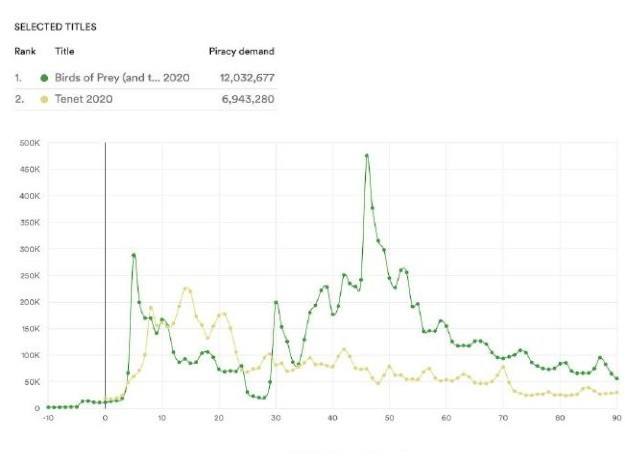 The movie industry is changing rapidly. Release windows are shrinking which means that films become available in digital format sooner.
The movie industry is changing rapidly. Release windows are shrinking which means that films become available in digital format sooner.
In some cases, theatrical and digital premieres take place on the same day. This is good news for consumers, as it increases their options.
Pirated HD Movies Become Available Quicker
Pirates are also happy with this new strategy. Instead of waiting several months, they can now download an HD copy right away. This is happening on a massive scale as we have seen with titles such as "Wonder Woman 1984".
This change in the piracy landscape means that movies recorded in theaters, the low-quality CAM versions, become even less relevant. Over the years these CAMs have already lost popularity, and with online premieres, this process accelerated.
The importance of quality and release windows is illustrated in a white paper published by piracy tracking firm MUSO a few days ago.
Comparing Piracy Cycles
The company compared the streaming piracy statistics of two Hollywood blockbusters. The first one, "Birds of Prey," saw a wide theatrical release in February 2020, followed by digital releases in March (US) and April (UK), which varied per country.
The second film is Tenet, which has a much longer release window. The movie premiered in theaters last August and was released digitally three months later in December.
Looking at the graphs below, it is clear that there was a bigger piracy spike for "Birds of Prey" early on because there was an HD copy available. This situation was made worse by the fact that pirated HD copies were available in several countries before the legitimate release.
Streaming piracy 10 days before and 90 days after the first release. (MUSO.com)

For Tenet there initially were only low-quality CAM rips on pirate sites, which the broader public tend to ignore. As a result, streaming piracy numbers were much lower.
"The strategy to not release Tenet digitally until December 15th resulted in the film having 42% less streaming piracy than Birds Of Prey in the first 90 days from release," MUSO writes.
Postponed Piracy, Not More Piracy?
While this statement is correct, the conclusion deserves some nuance which MUSO doesn't provide. Apart from the various limitations that come with measuring streaming piracy, the graph above doesn't include the biggest Tenet piracy spike, which came after 90 days.
In other words, with a longer release window until the digital release, the big piracy spike is simply postponed. Based on this single comparison, it's not possible to argue that there is more or less piracy with either strategy.
That said, the data also suggest that many pirates are happy to wait for months until an HD version becomes available. They prefer video quality over early access. This is an issue MUSO goes into as well.
Pirates Wait for HD Releases
If we look at Tenet piracy streaming beyond the first 90 days, we see that the highest number of 'views' came after 90 days, when the HD copy leaked on pirate sites.
This suggests that pirates are more interested in high-quality video. In fact, we wonder whether all people who tried to stream Tenet earlier actually watched the film. Some may have just clicked on it to check the quality, without watching it in full.
Tenet streaming piracy August-December 2020. (MUSO.com)

The appetite for HD releases is even more visible when we look at the interest in pirated Tenet copies on torrent sites. As shown below, the early CAM release only accounts for a fraction of the downloads compared to the HD version that came out months later.
Tenet P2P/torrent piracy August-December 2020 (MUSO.com)

"The P2P/torrent audience preferring to wait until the HD release on this title with 68% of these downloads happening in December alone," MUSO writes in their whitepaper.
"Torrenters are perhaps more interested in ownership and quality for this type of action-thriller blockbuster genre compared to the illegal streaming audience wanting early access via the leaked cinema CamRip," the company adds.
These data are particularly relevant today, as the movie industry has shortened release windows. In some cases, release windows have disappeared completely. Warner Bros, for example, now releases movies on HBO Max and in theaters simultaneously.
Longer Release Windows Are Not 'Better'
This means that for these films, the spike in piracy will come earlier as well. This could potentially mean that these pirated releases will hurt revenue for movie theaters as well. However, that's not something MUSO data can prove.
In fact, the only academic research on this topic suggests that shorter release windows don't increase piracy, it just takes place earlier.
Similarly, this research also found that shortened release windows don't hurt box office revenue and actually increase digital sales. In other words, movie studios earn more revenue, despite the fact that people pirate films earlier.
It's All About Revenue
In summary, MUSO's data neatly illustrates that the biggest piracy spikes concentrate around HD releases. However, that doesn't mean that delaying these releases will lower the overall piracy volume. It's not necessarily more profitable either, and may actually hurt revenue.
MUSO's whitepaper concludes that anti-piracy teams should understand the difference in piracy behavior, and adjust their enforcement strategies accordingly.
"Piracy is nuanced and varied, using detailed piracy consumption data allows companies to optimise and improve their anti-piracy results. Using data to drive decisions and focus on the right areas for an individual release, empowers more effective anti-piracy campaigns and ultimately drives revenue through legal channels," MUSO writes.
While we agree with this overall conclusion, seeing fewer pirated streams and downloads doesn't always lead to more revenue. So, it may actually be more important to consider how piracy affects sales.
From: TF, for the latest news on copyright battles, piracy and more.
No comments:
Post a Comment